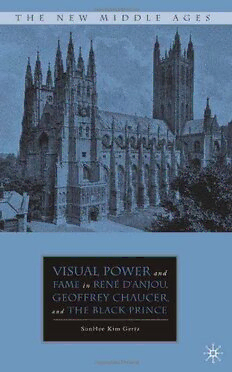
Visual Power and Fame in Rene d'Anjou, Geoffrey Chaucer, and the Black Prince (The New Middle Ages) PDF
248 Pages·2010·2.013 MB·English
Most books are stored in the elastic cloud where traffic is expensive. For this reason, we have a limit on daily download.
Preview Visual Power and Fame in Rene d'Anjou, Geoffrey Chaucer, and the Black Prince (The New Middle Ages)
Description:
Reading semiotically against the backdrop of medieval mirrors of princes, Arthurian narratives, and chronicles, this study examines how Ren? d’Anjou (1409-1480), Geoffrey Chaucer’s House of Fame (ca. 1375-1380), and Edward the Black Prince (1330-1376) explore fame’s visual power. While very different in approach, all three individuals reject the classical suggestion that fame is bestowed and understand that particularly in positions of leadership, it is necessary to communicate effectively with audiences in order to secure fame. This sweeping study sheds light on fame’s intoxicating but deceptively simple promise of elite glory.
See more
The list of books you might like
Most books are stored in the elastic cloud where traffic is expensive. For this reason, we have a limit on daily download.
